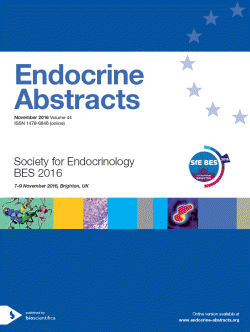Searchable abstracts of presentations at key conferences in endocrinology

Society for Endocrinology BES 2016
Brighton,
UK
07 Nov 2016 - 09 Nov 2016

07 Nov 2016 to 09 Nov 2016
Brighton, UK
Further information
Clinical Management Workshops
Workshop 3: How do I…
ea0044cmw3.1 | Workshop 3: How do I… | SFEBES2016
How I approach Drug-Induced Hyperprolactinaemia
Drug-induced hyperprolactinaemia is a frequently encountered clinical entity due to the large number of commonly prescribed medications that may influence prolactin secretion. Anti-psychotics, anti-depressants and anti-emetics are most frequently culpable, predominantly due to inhibitory effects on hypothalamic-pituitary dopamine signalling. The onset and severity of hyperprolactinaemia may be highly variable, and individuals may harbour typical symptoms (e.g. galactorrhoea, a...
ea0044cmw3.4 | Workshop 3: How do I… | SFEBES2016
How do I manage refractory hypercalcaemia?
Hypercalcaemia is a moderately common condition accounting for approximately 1% of all acute general medical presentations. Guidance on emergency management of the hypercalcaemic patient, aimed primarily at the generalist and at guiding initial stages of management has recently been developed by the society (https://www.endocrinology.org/policy/docs/13-02_EmergencyGuidance-Acute...
ea0044cmw3.5 | Workshop 3: How do I… | SFEBES2016
How do I prepare a patient for phaeo surgery?
All patients with phaeochromocytoma should undergo surgical resection by an experienced surgeon. Surgery should only be carried out after adequate medical preparation to minimize catecholamine-related adverse events. Pre-operative pharmacologic treatment is aimed at controlling hypertension and tachycardia, and volume expansion. This session will summarise the current practice in the medical management of patients with phaeochromocytoma at Hammersmith Hospital....
ea0044cmw3.6 | Workshop 3: How do I… | SFEBES2016
How do I determine Cortisol deficiency in the critically ill patient?
Critical illness is associated with significant morbidity and mortality. The changes in the hypothalamo-pituitary-adrenal (HPA) axis that occur during critical illness are complex and whilst early studies had suggested improved outcome in patients with septic shock treated with parenteral glucocorticoids, this was not endorsed in subsequent studies and it remains a highly controversial area.In patients with underlying pituitary or adrenal disease where c...



